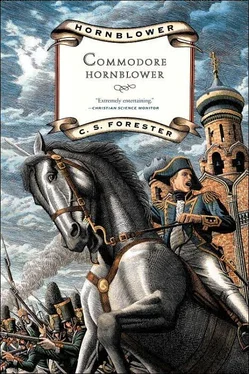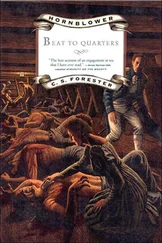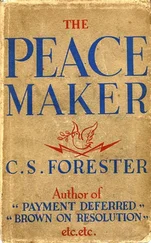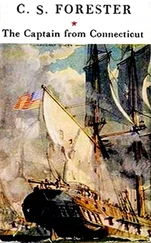Bush had come on deck, clearly sent for by Montgomery as officer of the watch. He was reading the deck log which Montgomery had inscribed on the slate, and he was studying the traverse board. Now he came stumping over to the starboard side of the quarter-deck to touch his hat to Hornblower.
“Reval—Tallinn as those Swedish charts call it, sir—bears south-east twenty-five miles by my reckoning, sir. That point of land to port is the north cape of Naissaar island, however it’s pronounced.”
“Thank you, Captain Bush.”
Hornblower even felt the temptation to vent his ill temper on Bush; he could imagine keenly enough how Bush would wilt and the hurt look that would come into his face at a sarcastic gibe at his mispronouncing of foreign names and his self-consciousness regarding it. Bush was always an easy target, and a satisfactory one from the point of view of readily apparent results, Hornblower dallied with the temptation while Bush stood before him awaiting orders. It was even amusing to keep him waiting like this; Hornblower suspected that Bush was nervously wondering what devilment he had in mind. Then in a wave of reaction Hornblower felt contempt for himself. It was bad enough that Vickery’s unknown officer of the watch should at this moment be in trouble because his Commodore was worried about what to do with Braun; it was far worse that the faithful, capable Bush should be suffering mental unhappiness for the same reason.
“Lay a course for Königsberg, Captain Bush, if you please.”
“Aye aye, sir.”
So far did the reaction go that Hornblower went on to explain the motives that guided him in reaching this decision.
“Danzig and Königsberg and East Prussia are Bonaparte’s base of operations. The army he has gathered in Poland is supplied by river and canal from there—by the Vistula and the Pregel and the Memel. We’re going to see if we can put a spoke in Bonaparte’s wheel.”
“Aye aye, sir.”
“I’ll put the squadron through general evolutions this morning.”
“Aye aye, sir.”
Bush was simply beaming at this remarkable unbending of his unpredictable chief. He was a long-suffering individual; as second-in-command he would be justified in looking upon it as his right to be admitted to the Commodore’s secrets. After all, a stray bullet, a falling spar, a stroke of disease might easily put him in command of the whole force. Yet he remained grateful for any scraps of information which Hornblower condescended to throw to him.
Nonsuch came round on the port tack as Bush and the sailing master decided on what course to steer. She lay over under her pyramids of canvas, the taut weather-rigging harping sharply to the wind, and Hornblower moved over from the starboard side to port, the windward side, as was his right. He looked back at the rest of the squadron, each vessel bracing sharp up in succession, following in the leader’s wake, Lotus and Raven, Moth and Harvey. Clam was not with them—she had been kept at Kronstadt to follow with any news Wychwood might be able to pick up—but five vessels were quite enough to exercise at manoeuvres.
“Bring me the signal book,” ordered Hornblower.
Flags raced up the halliards, each signal a chain of black balls, like beads on a string, until it was broken out, but in the other ships keen eyes were watching through telescopes, reading the flags even before they were broken out, and anxious officers were ordering the replies to be bent on ready to hoist without a moment’s delay. The squadron tacked in succession, wore together on a line of bearing, came to the wind again in succession into line ahead. They reduced sail in conformity with the leader—every ship sending every possible hand aloft to get in courses or topgallants the moment Hornblower’s intentions became clear—and they made sail again. They reefed topsails, double-reefed them, shook them out again. They hove-to, hoisted out their boats manned with armed boarding parties, and hoisted the boats in again. Resuming their course they opened their ports, ran out their guns, secured them again, and then ran them out and secured them again. A fresh signal mounted Nonsuch ’s halliards, headed by Raven ’s number.
“Commodore to Captain. Why did you not obey my order?”
Hornblower’s glass had detected that Raven had not fully secured her guns—she had not bolted her gun-ports so as to open them more quickly if the order should come, but Hornblower could see the ports opening slightly with the roll of the ship; moreover, judging by the little of the action of the guns’ crews that he could see she had not uncoupled and stowed her train-tackles, giving her a clear five seconds’ start over the other ships. It was foolish of Cole to try an old trick like that, and one so easily detected; it was right that Raven ’s shame should be proclaimed to the rest of the squadron. Half the object of manoeuvres was to sharpen the captains’ wits; if they could manage to outguess the Commodore, well and good, for there would be more likelihood of their outguessing a Frenchman should they meet one.
Raven hastily secured gun-ports and train-tackles; to rub the lesson in Hornblower waited until he was sure the order had just been passed on her decks and then sent up the signal for running out the guns. The counter-order following so quickly upon the order caught Raven unready—Hornblower could imagine the cursing officers on her main-deck—and she was seven full seconds behind any other ship in hoisting the ‘evolution completed’ signal. There was no need to comment on the fact, however—everybody in the Raven would be aware of what had happened and a further reprimand might weaken Cole’s authority over his ship’s company.
It was an active busy morning for all hands in the squadron, and Hornblower, looking back to the time when he was a midshipman, could well imagine the sigh of relief that must have gone round when at noon he signalled for the order of sailing and gave the men a chance to get their dinners. He watched the Nonsuch ’s crew form up to receive their ration of spirits; the eager, skylarking hands each carrying his wooden piggin; the guard over the grog tub—the latter with its painted inscription ‘The King, God bless him’; Montgomery and two master’s mates watching the issue. Hornblower saw one hand come up to the tub and be indignantly hustled away; evidently he was a defaulter who had been sentenced to lose his ration and who had nevertheless tried to obtain it. Such an attempt would earn a man at least two dozen lashes in some ships but, judging by Montgomery’s actions, it would mean no more than a further deprivation or a spell at the pumps or perhaps a turn at cleaning out the heads.
The liveliness and high spirits of everyone were reassuring. He could rely on these men to fight as desperately as any occasion could demand; equally important, he could rely on them to endure the long tedious days of beating about at sea, the wearisome monotony of life in a ship of the line, without more complaint than one need expect. But he must drop a hint to Bush to see that this happy condition endured. A hornpipe competition—theatricals—something of that sort would be necessary soon, unless there should happen to be enough action to keep the men’s minds busy. And with that decision he turned and went below, having managed, as a result of this morning’s activity, to drive out of his own mind any worry about what to do with Braun when the latter should recover from his wound. After all, he might yet die.
Besides, there were the charts of the Frisches Haff and the approaches to Königsberg to study, and plans to be made for assailing Bonaparte’s communications in the neighbourhood, should that be possible. If this fair wind should persist he had no more than three days in which to think out some method of attack there. He had the charts got out for him and he pored over them, irritably calling for lamps to light his dim cabin so as to make it possible to read the little figures scattered over them. The soundings were fantastically complex, and the problem of studying them was not made easier by the fact that he had three different charts to study—a Swedish one with the soundings marked in Swedish feet, a new French one with the soundings in metres, and only a sketchy English one in fathoms. It was a toilsome business comparing them, and perfectly unsatisfactory in the end, seeing that they did not agree.
Читать дальше












